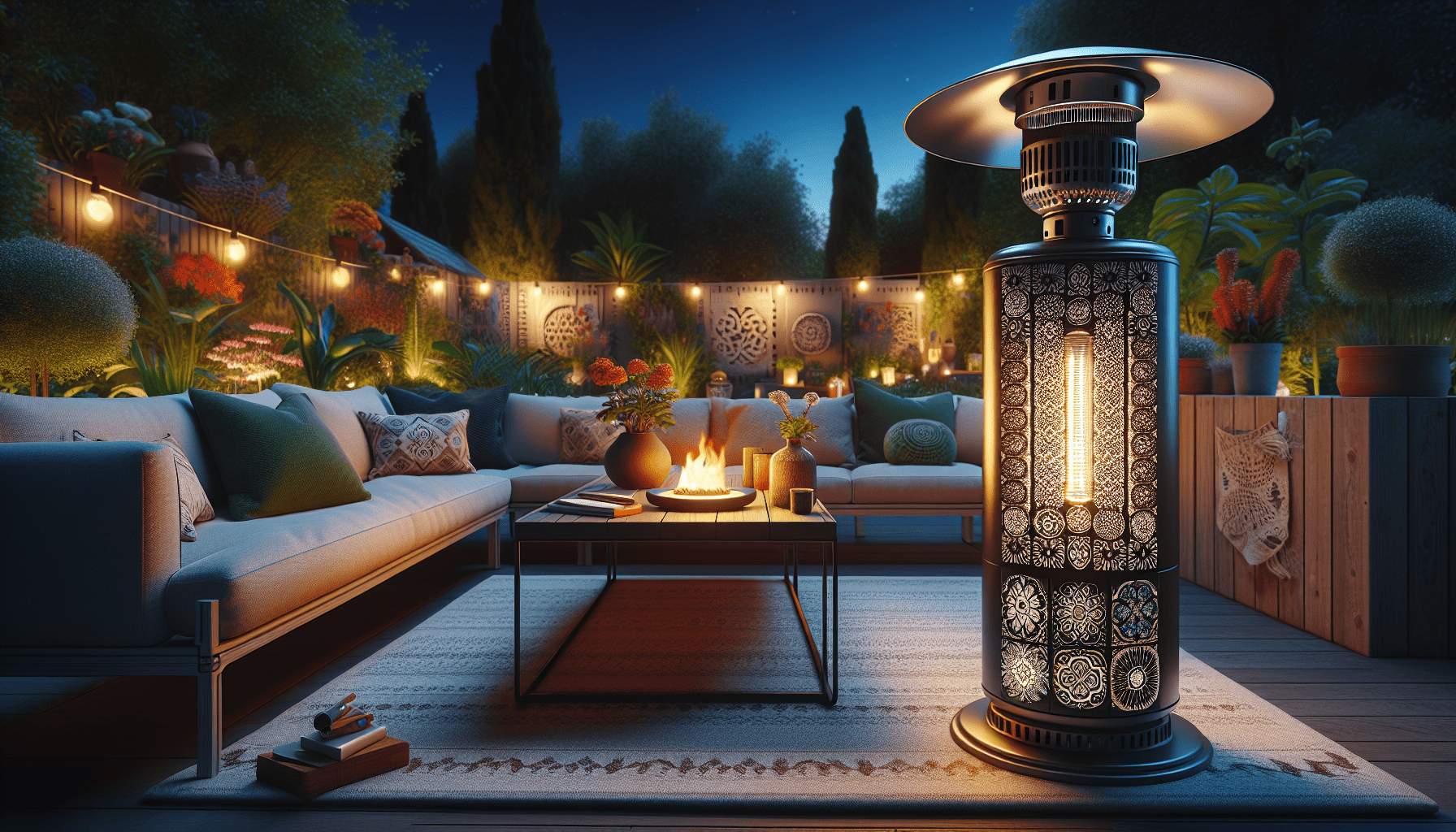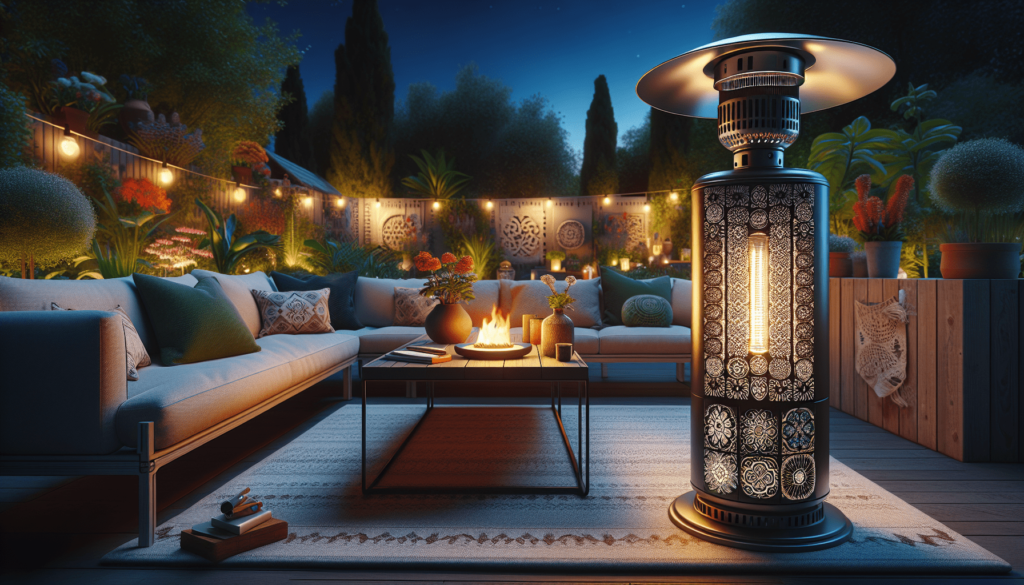
Have you ever looked at your patio heater and thought that it might need a little personal touch? Whether you’re spending a brisk autumn evening outside or hosting friends for a backyard gathering, having a unique, stylish, and efficient heater can really set the mood. Customizing your patio heater not only enhances its appearance but can also improve its efficiency, adding value to your outdoor space.
Understanding Your Patio Heater
Before jumping into customization, it’s crucial to understand what you’re working with. Patio heaters come in various types, models, and fuel options. From electric heaters, like the Infrared Electric Patio Heaters, to propane-fueled options such as those from Fire Sense, each has unique traits and potential.
Types of Patio Heaters
-
Propane Patio Heaters: These are highly popular due to their portability and ease of use. Brands like Sunjoy and Fire Sense offer efficient models that provide substantial heat output.
-
Natural Gas Patio Heaters: These are ideal if you have a natural gas outlet available. They require more installation but are usually more cost-effective in the long run. Examples include heaters from brands like Bromic Heating.
-
Electric Patio Heaters: These heaters are easy to install and are suitable for both indoor and outdoor use. They do not produce any emissions and are considered environmentally friendly, with brands such as Dr. Infrared Heater leading in efficiency.
Key Features to Consider
-
Heat Output: Measured in BTUs, this affects how much area your heater can cover.
-
Safety Features: Look for models with automatic shut-off systems.
-
Build Material: Stainless steel is preferred for durability.
Understanding these basics will guide you as you personalize your heater, ensuring your choices enhance style without sacrificing function.
Benefits of Customizing Your Patio Heater
Personalizing your patio heater isn’t merely about aesthetics. It’s about creating a blend of style, functionality, and efficiency that aligns with your specific needs.
Enhanced Visual Appeal
Custom modifications can take your patio heater from ordinary to extraordinary, complementing your overall outdoor decor. Whether it’s through creative paint jobs or adding unique accessories, you can turn it into a statement piece.
Improved Efficiency
Sometimes, modifications can increase your heater’s performance, such as boosting its heat distribution or fuel efficiency. For instance, adding a custom reflector can help direct more heat towards your seating area.
Tailored Features
By customizing, you can add or modify features that better suit your usage, such as mobility enhancements or control systems for easier operation.

Safety Considerations for Customizing
When embarking on your DIY journey, safety should always be a priority. There’s a balance between personalization and maintaining the structural and functional integrity of your heater.
Material Safety
Ensure that any materials or paints used are heat-resistant to prevent hazards or damage. High-temperature paint, for example, is essential when recoating heaters.
Electrical Adjustments
For electric heaters, if you’re uncomfortable with electrical modifications, consulting a professional is advisable to prevent accidents or damage.
Compliance with Regulations
Check if there are any restrictions or recommendations on modifications from the manufacturer to avoid voiding your warranty.
DIY Modifications for Style and Efficiency
Ready to get creative? Here are some impactful DIY modifications to make your heater stylish and efficient:
Painting Your Patio Heater
A new coat of paint is the simplest way to give your heater a fresh look. Use high-temperature spray paint available in a variety of colors to suit your patio decor.
- Preparation: Ensure the heater is clean and dry.
- Application: Use even strokes to apply the paint, allowing each coat to dry thoroughly before applying the next.
- Sealing: Consider a heat-resistant sealant to protect the paint and add a glossy finish.
Adding a Custom Heat Reflector
Heat reflectors can be added to direct heat more effectively. A simple sheet of stainless steel or aluminum cut to size can be installed above the heating element at an angle.
- Measurement: Determine the size needed based on the heater size and seating area.
- Installation: Use high-temperature adhesives or screws to secure the reflector.
Mobility Enhancements
Add wheels or casters to your heater for easier movement. This is particularly useful for larger propane or natural gas models.
- Selection: Purchase heat-resistant wheels that can support the heater’s weight.
- Installation: Secure the wheels at the base with metal brackets.
Remote Control System
Integrating a remote control system can allow you to adjust settings without leaving your seat. Many high-quality brands have compatible remote kits.
- Compatibility: Ensure your heater model is compatible with the system.
- Installation: Follow the manufacturer’s guidelines or consult a professional.
Incorporating Lighting Elements
Adding LED strips or lights to your heater can enhance ambiance. These can be fastened around the heater base or along its pole.
- Type: Choose waterproof and heat-resistant LED lights.
- Installation: Fix with secure adhesive strips.

Maintenance for Longevity
After customization, proper maintenance is essential for longevity and efficiency.
Regular Cleaning
Dust and debris can accumulate and affect performance. Regularly clean with a soft cloth and appropriate cleaning solutions.
Safety Checks
Regularly inspect your heater for any damage or wear, especially around newly added or modified parts.
Seasonal Storage
If not in use, especially during harsh weather, store the heater appropriately to protect it from the elements.
Conclusion
Whether you’re adding a splash of color or implementing heat-effective innovations, customizing your patio heater can transform your outdoor living experience. By focusing on both style and efficiency, you can create a personalized heater that not only complements your patio’s aesthetics but also enhances functionality. Just remember, every modification should be safe and in line with your heater’s specifications to ensure both efficiency and longevity. Happy crafting!



